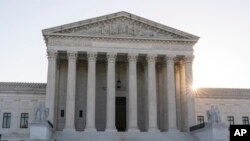The U.S. Supreme Court wades into the immigration debate on Tuesday as it examines the Biden administration's expulsion policies for undocumented migrants.
The Homeland Security Department, in a September 2021 memo, instructed US Immigration and Customs Enforcement (ICE) to concentrate expulsion efforts on persons who "pose a threat to national security, public safety, and border security."
"It is estimated that there are more than 11 million undocumented or otherwise removable noncitizens in the United States," Homeland Security Secretary Alejandro Mayorkas said in the memo.
"We do not have the resources to apprehend and seek the removal of every one of these noncitizens," Mayorkas said. "Therefore, we need to exercise our discretion and determine whom to prioritize for immigration enforcement action."
The policy represented a shift from that of the administration of former Republican president Donald Trump which called for the expulsion of "all removable aliens."
The Biden policy was immediately challenged by several Republican-led states as being too narrow and was blocked by a court in Texas.
The states argued that it imposes a heavy cost burden on the taxpayers because of the public services that would be needed to be provided to noncitizens.
The Biden administration challenged the Texas court's ruling and the conservative majority Supreme Court will hear oral arguments in the case, United States v. Texas, on Tuesday.
The administration is arguing that a decision in Texas's favor could have wide-ranging repercussions beyond immigration policy.
"Federal policies routinely have incidental effects on states' expenditures, revenues, and other activities," the government said in its brief.
"Yet such effects have never been viewed as judicially cognizable injuries," it said.
"As the recent explosion in state suits vividly illustrates, respondents' contrary view would allow any state to sue the federal government about virtually any policy."
The court is expected to issue its ruling by the end of June.




